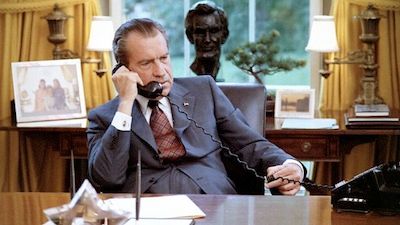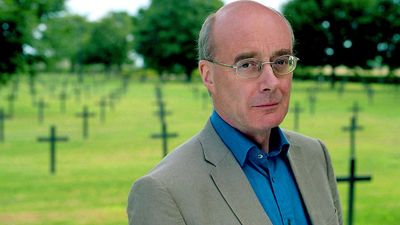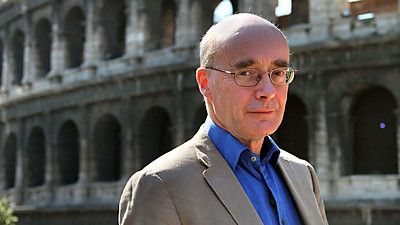The BEST episodes directed by Russell Barnes
#1 - God Strikes Back
The Genius of Charles Darwin - Season 1 - Episode 3
In this final episode Dawkins examines why Darwin's theory remains one of the most controversial ideas in history. As Darwin set out on the voyage on the Beagle he still believed that god created the world and everything in it. But the evidence he discovered - fossils, patterns of anatomical resemblance, startling similarities of embryos and domestic breeding - demonstrated the truth: that all life forms vary and that some are more likely to reproduce, passing variations on. His wife Emma, however, was deeply religious and Darwin never criticized religion in public but he believed that "science would bring about a gradual illumination of minds". Today, Dawkins argues, science has the evidence to prove that evolution is true. Modern discovery of the DNA code which links all life has added to the mountain of evidence showing that evolution is a fact. So why, he wonders as he meets creationists in America, is opposition to evolution more aggressive than ever? Dawkins is also concerned that back in the UK teaching evolution has become a hugely sensitive issue for science teachers: "This is multicultural Britain. And one of its fault lines runs straight through our children's classrooms. How do we reconcile scientific truth with the deeply held convictions that bind religious communities?" Returning to the school he visited in episode one, Dawkins confronts the science teachers and challenges their view that they "can't get in to the business of knocking down kid's religions and the religions of families." "There really is", he says, "something special about scientific evidence. Science works; planes fly. Magic carpets and broomsticks don't. Gravity isn't a version of the truth; it is the truth. Anybody who doubts it is invited to jump out of a tenth floor window. Evolution too, is reality." This equivocation, Dawkins says, began with the Church of England who, rather than attack Darwin, embraced him in a "comfortable relativist fudge". So he meets the Arc
Watch Now:Amazon#2 - Life, Darwin & Everything
The Genius of Charles Darwin - Season 1 - Episode 1
In the first part of the series, Richard Dawkins retraces Darwin's journey as a scientist. He re-examines the rich evidence of the natural world – iguanas on the Galapagos islands, giant fossilized sloths in the Americas and even pigeons back home in England – which opened Darwin's eyes to the extraordinary truth that all living things must be related and had evolved from a common ancestor. Darwin knew his espousal of evolution would cause outrage, challenging, as it did, the prevailing religious view of the world and our place in it. But, as Dawkins explains, it was really his theory of natural selection that undermined the notion of a benevolent God who designed all creatures great and small. Returning to his own birthplace, Kenya, Dawkins considers the brutal realities of the struggle for existence for wild animals on the plains of Africa. Here, he argues, we see the ongoing process sex, suffering and death, that drives evolution onward as the fittest survive to reproduce and the weakest perish without offspring. And humans are not immune to the nightmarish Darwinian process. Dawkins travels to the slums of Nairobi where hundreds die of AIDS each year. Here he meets prostitutes who seem to have acquired a genetic immunity to the HIV virus. This resistance, it seems, can be inherited and so, over time, will become more prevalent, shaping the community here. "This," Dawkins tells us, "is the unstoppable force of natural selection". Finally Dawkins visits a state of the art laboratory in America where scientists can now compare the genetic code of all living things, finally vindicating Darwin's theories once and for all. "He showed us that the world is beautiful and inspiring without a God. He revealed to us the glory of life and revealed who we really are and where we've come from". But back in Britain can Dawkins convince a year 11 science class that evolution is the truth? Fearing that "a few hours in the science lab is no substitute for a lifetim
Watch Now:Amazon#3 - The Fifth Ape
The Genius of Charles Darwin - Season 1 - Episode 2
In the second programme Prof. Dawkins explains that Darwin's Theory of Evolution presented a disturbing truth: that humans are animals – the fifth ape. This forces us to question whether our morals and manners are just a veneer. He confronts an issue that even Darwin skirted around – the evolution of human beings – and asks 'what does it mean to be evolved'? And in world where religions attack Darwinism for excusing selfish or even barbaric behaviour, Dawkins is forced to enter Darwinism's heart of darkness. Although natural selection is the driving force of our evolution Dawkins clarifies that this does not mean that society should be run on Darwinian lines. "As a scientist I'm thrilled by natural selection, but as a human being I abhor it as a principle for organising society." And humans are not immune to the nightmarish Darwinian process. Dawkins travels to the slums of Nairobi where hundreds die of AIDs each year. Here he meets prostitutes who seem to have acquired a genetic immunity to the HIV virus. This resistance, it seems, can be inherited and so, over time, will become more prevalent, shaping the community here. "This," Dawkins tells us, "is the unstoppable force of natural selection". Dawkins travels between Kenya (the birthplace of not only Dawkins, but the human race), America and the UK to explore what evolution really means for humans and human society. Starting out in Africa, he speaks to palaeontologist Richard Leakey who assures him that "we are closer to chimpanzees than a horse is to an ass". But Dawkins finds that many religions are nevertheless censoriously opposed to Darwin's Theory of Evolution. He cannot convince evangelical Bishop Bonifes Adoyo that man evolved from ape, and posits that many (fearfully) reject Darwinism as a goal-less, soul-less theory. If nature – often ruthlessly competitive – is the model for human society then surely we inhabit a 'dog eat dog' world. Exploring this line of thought, Dawkins inve
Watch Now:Amazon
#4 - Nixon in the Den
BBC Documentaries - Season 2010 - Episode 34
David Reynolds takes a fresh look at the controversial career and embattled presidency of Richard Nixon. Reynolds sees Nixon as a successful international statesman, but that the methods that won him this acclaim also doomed his presidency in the Watergate scandal. Using memos, audio and home movie footage, the film throws new light on Nixon's secrecy, deception and mistrust of aides, as he ran his presidency largely from his 'den' - a hideaway office across the road from the White House.

#5 - Armistice
BBC Documentaries - Season 2008 - Episode 58
Professor David Reynolds takes a fresh look at the extraordinary events and personalities that brought about the armistice of 1918, venturing beyond the familiar British account of Remembrance Day to unravel how the other side, the Germans, plunged to total defeat in just a few months at the end of the war. In a journey that takes him through command centres and battlefields, he uncovers a story of wounded egos, mental illness and political brinkmanship as statesmen and generals haggled over the terms of peace, while, at the front, the soldiers fought on with sustained brutality. For many Germans, the armistice was a betrayal of all they had fought for and it caused lasting resentments that would eventually fuel Adolf Hitler's rise to power. Reynolds argues that the bitter endgame of the 'war to end all wars' tragically sowed the seeds of even more appalling conflict to come.

#6 - World War Two: 1941 and the Man of Steel
BBC Documentaries - Season 2011 - Episode 112
Marking the 70th anniversary of the Nazi invasion of the Soviet Union in 1941, historian Professor David Reynolds re-assesses Stalin's role in the life and death struggle between Germany and Russia in World War Two, which, he argues, was ultimately more critical for British survival than 'Our Finest Hour' in the Battle of Britain itself.

#7 - World War Two: 1942 and Hitler's Soft Underbelly
BBC Documentaries - Season 2012 - Episode 185
The British fought the Second World War to defeat Hitler. This film asks why, then, did they spend so much of the conflict battling through North Africa and Italy? Historian David Reynolds reassesses Winston Churchill's conviction that the Mediterranean was the 'soft underbelly' of Hitler's Europe. Travelling to Egypt and Italian battlefields like Cassino, scene of some of the worst carnage in western Europe, he shows how, in reality, the 'soft underbelly' became a dark and dangerous obsession for Churchill. Reynolds reveals a prime minister very different from the jaw-jutting bulldog of Britain's 'finest hour' in 1940 - a leader who was politically vulnerable at home, desperate to shore up a crumbling British empire abroad, losing faith in his army and even ready to deceive his American allies if it might delay fighting head to head against the Germans in northern France. The film marks the seventieth anniversary of the Battle of El Alamein in 1942.